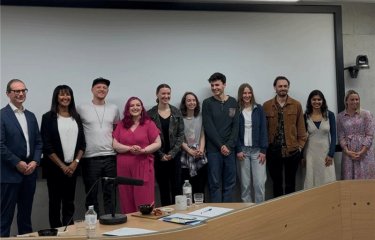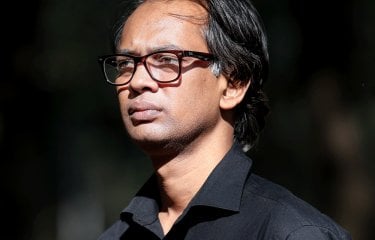Top 5 sustainable fashion publications and podcasts
09 January 2024

With increasing evidence suggesting the fashion industry plays a significant role in global heating, ecological devastation and societal inequality, the system needs to change. We asked Sustainable Fashion MA (Online) course leader Tom Crisp and module leader Sabine Lettman for the top five sustainable fashion publications and podcasts to inspire future fashion industry innovators.
In a society that’s becoming increasingly aware of the environmental impact of its actions, the term ‘sustainable fashion’ is growing in prevalence. In essence, sustainable fashion refers to the efforts made within the fashion industry to reduce the impact made on the natural world and its inhabitants.
As a major annual contributor to global greenhouse gas emissions, and with a long history of extracting raw materials from the planet and the exploitation of people and animals, fashion brands and businesses are touting their sustainability credentials with increasing volume. Yet, many so-called ‘sustainable’ practices within the industry are failing to make the systemic transformations needed to prevent planetary harm.
Falmouth’s online Sustainable Fashion master’s sets out to empower change makers to pioneer a redesign of the fashion industry for the better. Here, course leader Tom Crisp and module leader Sabine Lettman share their top five resources to introduce you to sustainable fashion in all its depth.
Earth beyond six of nine planetary boundaries
This group article introduces the underpinning rationale behind the need for change within the fashion industry. Exploring why we need to move from a system that facilitates resource extraction, overproduction and pollution to one that is in symbiosis with nature, the article evidences the transgression of six out of nine planetary boundaries resulting from human activities and discusses why we have already moved beyond a safe space in which humans can exist.
Whilst this fact could certainly lead to a state of apathy, we believe that by becoming fashion activists, we can overcome this ecoanxiety, and so we encourage learning as a rebellious act of care for nature and humanity.
Slow Violence and the Environmentalism of the Poor
Issues such as climate change and pollution typically happen over an extended period, so the destruction of habitats and livelihoods they cause is often strategically neglected despite being scientifically evidenced. Those in poorer nations are disproportionately affected by these issues and require far more attention than they currently receive.
This 2011 book by Rob Nixon investigates how the activities of the Global North instigate what he calls ‘slow violence’: “a violence that occurs gradually and out of sight, a violence of delayed destruction that is dispersed across time and space, an attritional violence that is typically not viewed as violence at all”.
Fashion, its Sacrifice Zone, and Sustainability
Connected to Rob Nixon’s work is Sandra Niessen’s 2020 article in which she discusses how the fashion industry has become an existential threat to many people in the Global South. The fashion world has historically been Eurocentric and therefore still facilitates colonialism. This can be through direct exploitation, or through what has been identified as ‘waste colonialism’ – when endless discarded garments are shipped from European or American markets to African countries, for example.
Through an ongoing oppression of marginalised people and imbalanced power dynamics, the fashion industry continues to draw from so-called ‘sacrifice zones’ which Niessen describes as “resource-rich lands, generally associated with minority communities that are considered dispensable and exploited for economic gain”.
Thinking in Systems: A Primer
Alongside thinking about how the industry can move towards regenerative practices, one of the main approaches to redesigning the industry is to think in systems explored in Donella Meadows’ 2008 book.
She describes a system as “a set of things - people, cells, molecules or whatever – interconnected in such a way that they produce their own pattern of behaviour over time”. Already identified as a complex system, the fashion industry cannot be changed without the consideration of systems thinking and so, this book is core to the reimagining of a different kind of fashion industry and offers an insightful background to our master’s course.
Indigenous Economics with Tyson Yunkaporta
This 2021 Upstream podcast episode with author and scholar Tyson Yunkaporta draws on his background as part of the Apalech Clan in Queensland, Australia. By shining a light on a different perspective of complexity and economics, we can get closer to identifying potential leverage points for change that decolonise and embrace real societal change – only made possible by exploring different voices and perspectives.
In the podcast, Yunkaporta discusses how his peoples’ value systems and structures of relations have been lived in symbiosis with nature for centuries. This approach reflects how, as a course community, we aim to embed non-Western viewpoints into the curriculum to offer a variety of relevant knowledge as well as provide vital representation of different cultures.




